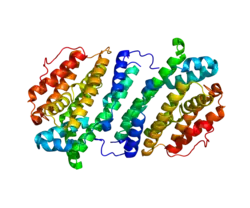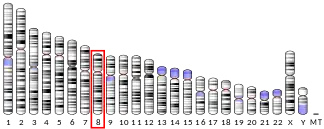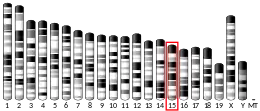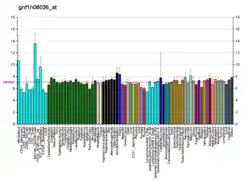RRM2B
Ribonucleotide-diphosphate reductase subunit M2 B is an enzyme that in humans is encoded by the RRM2B gene.[5][6][7][8] The gene encoding the RRM2B protein is located on chromosome 8, at position 8q23.1. The gene and its products are also known by designations MTDPS8A, MTDPS8B, and p53R2.
| RRM2B | |||||||||||||||||||||||||||||||||||||||||||||||||||
|---|---|---|---|---|---|---|---|---|---|---|---|---|---|---|---|---|---|---|---|---|---|---|---|---|---|---|---|---|---|---|---|---|---|---|---|---|---|---|---|---|---|---|---|---|---|---|---|---|---|---|---|
 | |||||||||||||||||||||||||||||||||||||||||||||||||||
| |||||||||||||||||||||||||||||||||||||||||||||||||||
| Identifiers | |||||||||||||||||||||||||||||||||||||||||||||||||||
| Aliases | RRM2B, MTDPS8A, MTDPS8B, P53R2, ribonucleotide reductase regulatory TP53 inducible subunit M2B, RCDFRD | ||||||||||||||||||||||||||||||||||||||||||||||||||
| External IDs | OMIM: 604712 MGI: 2155865 HomoloGene: 56723 GeneCards: RRM2B | ||||||||||||||||||||||||||||||||||||||||||||||||||
| |||||||||||||||||||||||||||||||||||||||||||||||||||
| |||||||||||||||||||||||||||||||||||||||||||||||||||
| |||||||||||||||||||||||||||||||||||||||||||||||||||
| |||||||||||||||||||||||||||||||||||||||||||||||||||
| Wikidata | |||||||||||||||||||||||||||||||||||||||||||||||||||
| |||||||||||||||||||||||||||||||||||||||||||||||||||
Function
RRM2B codes for one of two versions of the R2 subunit of ribonucleotide reductase, which generates nucleotide precursors required for DNA replication by reducing ribonucleoside diphosphates to deoxyribonucloside diphosphates. The version of R2 encoded by RRM2B is induced by p53, and is required for normal DNA repair and mtDNA synthesis in non-proliferating cells. The other form of R2 is expressed only in dividing cells.[9]
Interactions
RRM2B has been shown to interact with Mdm2[10] and Ataxia telangiectasia mutated.[10]
Clinical relevance
Abnormalities in this gene are one of the causes of mitochondrial DNA depletion syndrome (MDDS).[11][12] Neonatal hypotonia, developmental delay, encephalopathy, with seizures, deafness and lactic acidosis have been associated with mutations in this gene. MDDS is fatal, with death occurring from respiratory failure in early childhood.[13][14]
It has been associated with some cases of pediatric acute liver failure.[15]
Mutations in this gene have been shown to cause progressive external ophthalmoplegia.[16]
Increased expression of RRM2B has been correlated with gemcitabine resistance in human cholangiocarcinoma cells[17] and may be predictive of lack of clinical benefit from gemcitabine for human cancers.
References
- GRCh38: Ensembl release 89: ENSG00000048392 - Ensembl, May 2017
- GRCm38: Ensembl release 89: ENSMUSG00000022292 - Ensembl, May 2017
- "Human PubMed Reference:". National Center for Biotechnology Information, U.S. National Library of Medicine.
- "Mouse PubMed Reference:". National Center for Biotechnology Information, U.S. National Library of Medicine.
- Tanaka H, Arakawa H, Yamaguchi T, Shiraishi K, Fukuda S, Matsui K, Takei Y, Nakamura Y (March 2000). "A ribonucleotide reductase gene involved in a p53-dependent cell-cycle checkpoint for DNA damage". Nature. 404 (6773): 42–9. Bibcode:2000Natur.404...42T. doi:10.1038/35003506. PMID 10716435. S2CID 4327888.
- Nakano K, Bálint E, Ashcroft M, Vousden KH (August 2000). "A ribonucleotide reductase gene is a transcriptional target of p53 and p73". Oncogene. 19 (37): 4283–9. doi:10.1038/sj.onc.1203774. PMID 10980602.
- Bourdon A, Minai L, Serre V, Jais JP, Sarzi E, Aubert S, Chrétien D, de Lonlay P, Paquis-Flucklinger V, Arakawa H, Nakamura Y, Munnich A, Rötig A (June 2007). "Mutation of RRM2B, encoding p53-controlled ribonucleotide reductase (p53R2), causes severe mitochondrial DNA depletion". Nature Genetics. 39 (6): 776–80. doi:10.1038/ng2040. PMID 17486094. S2CID 22103978.
- "Entrez Gene: RRM2B ribonucleotide reductase M2 B (TP53 inducible)".
- Copeland WC (2012). "Defects in mitochondrial DNA replication and human disease". Critical Reviews in Biochemistry and Molecular Biology. 47 (1): 64–74. doi:10.3109/10409238.2011.632763. PMC 3244805. PMID 22176657.
- Chang L, Zhou B, Hu S, Guo R, Liu X, Jones SN, Yen Y (November 2008). "ATM-mediated serine 72 phosphorylation stabilizes ribonucleotide reductase small subunit p53R2 protein against MDM2 to DNA damage". Proceedings of the National Academy of Sciences of the United States of America. 105 (47): 18519–24. Bibcode:2008PNAS..10518519C. doi:10.1073/pnas.0803313105. PMC 2587585. PMID 19015526.
- Gorman GS, Taylor RW (April 17, 2014). "RRM2B-Related Mitochondrial Disease". GeneReviews. University of Washington, Seattle. PMID 24741716.
- "RRM2B-related mitochondrial DNA depletion syndrome, encephalomyopathic form with renal tubulopathy". United States National Library of Medicine. Retrieved 13 July 2017.
- Acham-Roschitz B, Plecko B, Lindbichler F, Bittner R, Mache CJ, Sperl W, Mayr JA (November 2009). "A novel mutation of the RRM2B gene in an infant with early fatal encephalomyopathy, central hypomyelination, and tubulopathy". Molecular Genetics and Metabolism. 98 (3): 300–4. doi:10.1016/j.ymgme.2009.06.012. PMID 19616983.
- Kropach N, Shkalim-Zemer V, Orenstein N, Scheuerman O, Straussberg R (May 2017). "Novel RRM2B Mutation and Severe Mitochondrial DNA Depletion: Report of 2 Cases and Review of the Literature". Neuropediatrics. 48 (6): 456–462. doi:10.1055/s-0037-1601867. PMID 28482374. S2CID 7809119.
- Valencia CA, Wang X, Wang J, Peters A, Simmons JR, Moran MC, Mathur A, Husami A, Qian Y, Sheridan R, Bove KE, Witte D, Huang T, Miethke AG (2016). "Deep Sequencing Reveals Novel Genetic Variants in Children with Acute Liver Failure and Tissue Evidence of Impaired Energy Metabolism". PLOS ONE. 11 (8): e0156738. Bibcode:2016PLoSO..1156738V. doi:10.1371/journal.pone.0156738. PMC 4970743. PMID 27483465.
- Takata A, Kato M, Nakamura M, Yoshikawa T, Kanba S, Sano A, Kato T (September 2011). "Exome sequencing identifies a novel missense variant in RRM2B associated with autosomal recessive progressive external ophthalmoplegia". Genome Biology. 12 (9): R92. doi:10.1186/gb-2011-12-9-r92. PMC 3308055. PMID 21951382.
- Sato J, Kimura T, Saito T, Anazawa T, Kenjo A, Sato Y, Tsuchiya T, Gotoh M (September 2011). "Gene expression analysis for predicting gemcitabine resistance in human cholangiocarcinoma". Journal of Hepato-Biliary-Pancreatic Sciences. 18 (5): 700–11. doi:10.1007/s00534-011-0376-7. PMID 21451941. S2CID 19975519.
Further reading
- Guittet O, Håkansson P, Voevodskaya N, Fridd S, Gräslund A, Arakawa H, Nakamura Y, Thelander L (November 2001). "Mammalian p53R2 protein forms an active ribonucleotide reductase in vitro with the R1 protein, which is expressed both in resting cells in response to DNA damage and in proliferating cells". The Journal of Biological Chemistry. 276 (44): 40647–51. doi:10.1074/jbc.M106088200. PMID 11517226.
- Yamaguchi T, Matsuda K, Sagiya Y, Iwadate M, Fujino MA, Nakamura Y, Arakawa H (November 2001). "p53R2-dependent pathway for DNA synthesis in a p53-regulated cell cycle checkpoint". Cancer Research. 61 (22): 8256–62. PMID 11719458.
- Yanamoto S, Kawasaki G, Yoshitomi I, Mizuno A (February 2003). "Expression of p53R2, newly p53 target in oral normal epithelium, epithelial dysplasia and squamous cell carcinoma". Cancer Letters. 190 (2): 233–43. doi:10.1016/S0304-3835(02)00588-8. PMID 12565178.
- Xue L, Zhou B, Liu X, Qiu W, Jin Z, Yen Y (March 2003). "Wild-type p53 regulates human ribonucleotide reductase by protein-protein interaction with p53R2 as well as hRRM2 subunits". Cancer Research. 63 (5): 980–6. PMID 12615712.
- Zhou B, Liu X, Mo X, Xue L, Darwish D, Qiu W, Shih J, Hwu EB, Luh F, Yen Y (October 2003). "The human ribonucleotide reductase subunit hRRM2 complements p53R2 in response to UV-induced DNA repair in cells with mutant p53". Cancer Research. 63 (20): 6583–94. PMID 14583450.
- Shao J, Zhou B, Zhu L, Qiu W, Yuan YC, Xi B, Yen Y (January 2004). "In vitro characterization of enzymatic properties and inhibition of the p53R2 subunit of human ribonucleotide reductase". Cancer Research. 64 (1): 1–6. doi:10.1158/0008-5472.CAN-03-3048. PMID 14729598.
- Ceballos E, Muñoz-Alonso MJ, Berwanger B, Acosta JC, Hernández R, Krause M, Hartmann O, Eilers M, León J (June 2005). "Inhibitory effect of c-Myc on p53-induced apoptosis in leukemia cells. Microarray analysis reveals defective induction of p53 target genes and upregulation of chaperone genes". Oncogene. 24 (28): 4559–71. doi:10.1038/sj.onc.1208652. PMID 15856024.
- Deng ZL, Xie DW, Bostick RM, Miao XJ, Gong YL, Zhang JH, Wargovich MJ (September 2005). "Novel genetic variations of the p53R2 gene in patients with colorectal adenoma and controls". World Journal of Gastroenterology. 11 (33): 5169–73. doi:10.3748/wjg.v11.i33.5169 (inactive 1 August 2023). PMC 4320390. PMID 16127747.
{{cite journal}}: CS1 maint: DOI inactive as of August 2023 (link) - Ohno K, Tanaka-Azuma Y, Yoneda Y, Yamada T (December 2005). "Genotoxicity test system based on p53R2 gene expression in human cells: examination with 80 chemicals". Mutation Research. 588 (1): 47–57. doi:10.1016/j.mrgentox.2005.09.002. PMID 16236544.
- Qiu W, Zhou B, Darwish D, Shao J, Yen Y (February 2006). "Characterization of enzymatic properties of human ribonucleotide reductase holoenzyme reconstituted in vitro from hRRM1, hRRM2, and p53R2 subunits". Biochemical and Biophysical Research Communications. 340 (2): 428–34. doi:10.1016/j.bbrc.2005.12.019. PMID 16376858.
- Okumura H, Natsugoe S, Yokomakura N, Kita Y, Matsumoto M, Uchikado Y, Setoyama T, Owaki T, Ishigami S, Aikou T (June 2006). "Expression of p53R2 is related to prognosis in patients with esophageal squamous cell carcinoma". Clinical Cancer Research. 12 (12): 3740–5. doi:10.1158/1078-0432.CCR-05-2416. PMID 16778101.
- Yen Y, Chu B, Yen C, Shih J, Zhou B (2007). "Enzymatic property analysis of p53R2 subunit of human ribonucleotide reductase". Advances in Enzyme Regulation. 46: 235–47. doi:10.1016/j.advenzreg.2006.01.016. PMID 16846634.
- Lembo D, Donalisio M, Cornaglia M, Azzimonti B, Demurtas A, Landolfo S (December 2006). "Effect of high-risk human papillomavirus oncoproteins on p53R2 gene expression after DNA damage". Virus Research. 122 (1–2): 189–93. doi:10.1016/j.virusres.2006.06.011. PMID 16872707.
- Yokomakura N, Natsugoe S, Okumura H, Ikeda R, Uchikado Y, Mataki Y, Takatori H, Matsumoto M, Owaki T, Ishigami S, Aikou T (September 2007). "Improvement in radiosensitivity using small interfering RNA targeting p53R2 in esophageal squamous cell carcinoma". Oncology Reports. 18 (3): 561–7. doi:10.3892/or.18.3.561. PMID 17671702.




